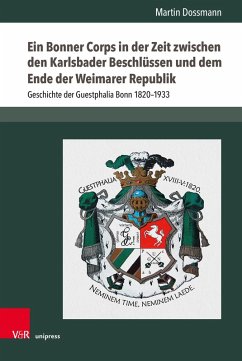Bereits 1799 wurde mit dem Westphalenkartell der Grundstein für das Corps Guestphalia gelegt, das 1820 in Bonn gestiftet wurde. Die Westphalen litten in den ersten zwei Jahrzehnten ihrer Existenz unter den Demagogenverfolgungen an der Universität. Unter den Corpsstudenten, die 1848/49 Abgeordnete der Nationalversammlungen waren, stellten Bonner Westphalen die größte Gruppe. In der Wilhelminischen Zeit erlebte das Corps ab 1888 eine Blütezeit, die allerdings von negativen Entwicklungen begleitet war (übertriebene Exklusivität und selbstgewählte Isolation). Dem Ersten Weltkrieg folgte eine harte französische Besatzungszeit, die das Corps bis 1926 stark beeinträchtigte. Die Weimarer Republik, die von vielen Corpsstudenten abgelehnt wurde, sorgte nur sehr kurz für »Goldene Jahre«.
In 1799, the Westphalian Cartel laid the foundation for the Corps Guestphalia, which was founded in Bonn in 1820. During the first two decades of its existence, the Westphalians suffered from the persecution of demagogues at the university. Among the Corps students, who were members of the National Assemblies in 1848/49, Westphalians derived from Bonn were the largest group. During the Wilhelminian era, the Corps experienced a period of prosperity from 1888 onward. However, this development was accompanied by negative developments such as excessive exclusivity and self-imposed isolation. After World War I, the Corps suffered from the harsh French occupation, which severely affected it until 1926. The Weimar Republic, which numerous Corps students opposed, only provided a short period of "golden years".
In 1799, the Westphalian Cartel laid the foundation for the Corps Guestphalia, which was founded in Bonn in 1820. During the first two decades of its existence, the Westphalians suffered from the persecution of demagogues at the university. Among the Corps students, who were members of the National Assemblies in 1848/49, Westphalians derived from Bonn were the largest group. During the Wilhelminian era, the Corps experienced a period of prosperity from 1888 onward. However, this development was accompanied by negative developments such as excessive exclusivity and self-imposed isolation. After World War I, the Corps suffered from the harsh French occupation, which severely affected it until 1926. The Weimar Republic, which numerous Corps students opposed, only provided a short period of "golden years".








